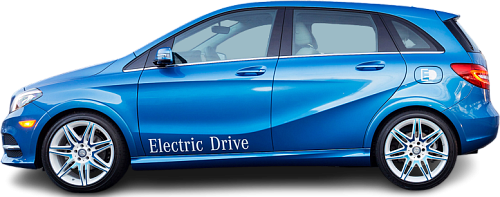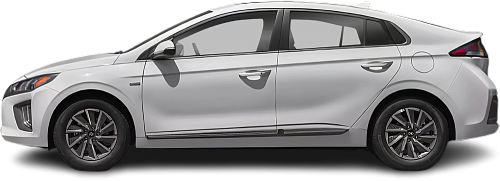Global EV Comparison: Mercedes B-Class 250e vs Hyundai Ioniq Electric Gen 2
Struggling to Decide? Let AI Help!
Your AI Summary Is Ready!
General Info
Since both vehicles have been discontinued, they are now only available on the used car market. You can get the Mercedes B 250e (2014-2017) for as low as €11990, while the Hyundai Ioniq Electric Gen 2 (2019-2022) begins at €14900.
The Mercedes B 250e (2014-2017) is a Hatchback, whereas the Hyundai Ioniq Electric Gen 2 (2019-2022) is a Liftback.
| Property | Mercedes B-Class 250e | Hyundai Ioniq Electric Gen 2 |
|---|---|---|
| Years of Production | 2014-2017 | 2019-2022 |
| Current Status | Discontinued | Discontinued |
| Country of Manufacture | Germany, Hungary | South Korea |
| Body Style | Hatchback | Liftback |
| Market Availability | EU, USA | EU, USA |
| Price Europe (Used) | €11990 | €14900 |
| GCC Score | 4.6 | 5 |
Range and Efficiency
The Hyundai Ioniq Electric Gen 2 (2019-2022) boasts a greater real-world range, a larger battery, and superior energy efficiency compared to the Mercedes B 250e (2014-2017).
| Property | Mercedes B-Class 250e | Hyundai Ioniq Electric Gen 2 |
|---|---|---|
| Range (EPA) | 140 km | 274 km |
| Range (WLTP) | - Range (WLTP) | 311 km |
| Range (GCC) | 142 km | 262 km |
| Battery Capacity (Nominal) | 31 kWh | 40.4 kWh |
| Battery Capacity (Usable) | 28 kWh | 38.3 kWh |
| Efficiency per 100 km | 19.7 kWh/100 km | 14.6 kWh/100 km |
| Efficiency per kWh | 5.07 km/kWh | 6.84 km/kWh |
| Range and Efficiency Score | 4 | 6.3 |
Charging
Both vehicles utilize a standard 400-volt architecture.
The Mercedes B 250e (2014-2017) has no DC fast charging capability, whereas the Hyundai Ioniq Electric Gen 2 (2019-2022) can charge at up to 44 kW.
The Mercedes B 250e (2014-2017) features a more powerful on-board charger, supporting a maximum AC charging power of 9.6 kW, whereas the Hyundai Ioniq Electric Gen 2 (2019-2022) is limited to 7.2 kW.
| Property | Mercedes B-Class 250e | Hyundai Ioniq Electric Gen 2 |
|---|---|---|
| Max Charging Power (AC) | 9.6 kW | 7.2 kW |
| Max Charging Power (DC) | - Max Charging Power (DC) | 44 kW |
| Architecture | 400 V | 400 V |
| Charge Port | Type 2 (Mennekes) | CCS Type 2 |
| Charging Score | 3.9 | 3.9 |
Performance
Both vehicles are front-wheel drive.
The Mercedes B 250e (2014-2017) boasts greater motor power and accelerates faster from 0 to 100 km/h.
| Property | Mercedes B-Class 250e | Hyundai Ioniq Electric Gen 2 |
|---|---|---|
| Drive Type | FWD | FWD |
| Motor Type | PMSM | PMSM |
| Motor Power (kW) | 132 kW | 100 kW |
| Motor Power (hp) | 177 hp | 134 hp |
| Motor Torque | 340 Nm | 295 Nm |
| 0-100 km/h | 7.9 s | 9.7 s |
| Top Speed | 160 km/h | 165 km/h |
| Performance Score | 3.5 | 3 |
Dimensions
The Hyundai Ioniq Electric Gen 2 (2019-2022) has a longer body, while the Mercedes B 250e (2014-2017) stands taller, offering a more elevated ride. Their widths are almost identical, so both offer a similar amount of shoulder room.
Both models have similar wheelbase lengths.
| Property | Mercedes B-Class 250e | Hyundai Ioniq Electric Gen 2 |
|---|---|---|
| Length | 4359 mm | 4470 mm |
| Width (with Mirrors) | 2010 mm | 2045 mm |
| Width (w/o Mirrors) | 1786 mm | 1820 mm |
| Height | 1557 mm | 1450 mm |
| Wheelbase | 2699 mm | 2700 mm |
Cargo and Towing
The Mercedes B 250e (2014-2017) provides more cargo capacity, featuring both a larger trunk and more space with the rear seats folded.
Neither car is equipped with a frunk (front trunk).
Neither vehicle is officially rated for towing in in the EU.
| Property | Mercedes B-Class 250e | Hyundai Ioniq Electric Gen 2 |
|---|---|---|
| Number of Seats | 5 | 5 |
| Curb Weight | 1725 kg | 1602 kg |
| Cargo Volume (Trunk) | 501 l | 357 l |
| Cargo Volume (Max) | 1456 l | 1417 l |
| Cargo Volume (Frunk) | - Cargo Volume (Frunk) | - Cargo Volume (Frunk) |
| Towing Capacity | - Towing Capacity | - Towing Capacity |
| Cargo and Towing Score | 4.5 | 4.1 |




